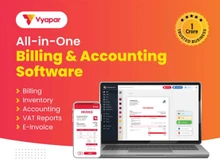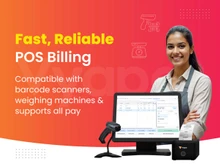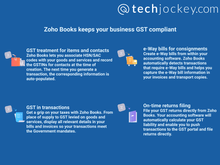Vyapar and Zoho Books are two prominent solutions in billing and invoicing, each catering to distinct business needs and functionalities. Vyapar focuses on simplifying billing and accounting for small businesses in India, while Zoho Books offers a comprehensive accounting platform with global capabilities. Here's a detailed comparison to help you understand their strengths and which might be the best fit for your business.
Vyapar vs Zoho Books: Overview
Vyapar is an accounting and invoicing software designed specifically for small businesses in India. It aims to streamline the process of billing, inventory management, and accounting with a user-friendly interface. Vyapar is particularly beneficial for businesses that need a solution tailored to local regulations and GST compliance.
Zoho Books, on the other hand, is a robust cloud-based accounting software that provides a full suite of features for financial management. It caters to a global audience with extensive functionalities including invoicing, expense tracking, bank reconciliation, and tax management. Zoho Books is well-suited for growing businesses that require a comprehensive accounting solution with advanced features.
Vyapar vs Zoho Books: Pros & Cons
Vyapar Pros:
- Localized for Indian businesses, including GST compliance and support for Indian languages.
- User-friendly interface tailored to small businesses.
- Affordable pricing plans.
- Includes inventory management and billing features.
Vyapar Cons:
- Limited international functionality and support for multi-currency transactions.
- It may not have the depth of advanced accounting features available in more global solutions.
- Fewer integrations with other global software and platforms.
Zoho Books Pros:
- Comprehensive accounting features including expense tracking, bank reconciliation, and advanced reporting.
- Supports multi-currency transactions and global tax compliance.
- Robust integration with other Zoho products and third-party applications.
- Extensive reporting capabilities with detailed financial insights.
Zoho Books Cons:
- It can be more complex to navigate due to its wide range of features.
- Subscription costs may be higher compared to local solutions like Vyapar.
- The initial setup and learning curve can be steep for users not familiar with comprehensive accounting software.
Vyapar vs Zoho Books: In Terms of Features
Invoicing Capabilities:
- Vyapar offers efficient invoicing with GST compliance features tailored for Indian businesses. It includes customizable invoice templates and automated billing processes.
- Zoho Books provides a broader range of invoicing features, including multi-currency invoicing, recurring invoices, and advanced invoice tracking.
Accounting:
- Vyapar includes essential accounting features suitable for small businesses, such as ledger management and GST reporting.
- Zoho Books excels in accounting with features like detailed financial reports, bank reconciliation, and automated expense tracking.
Tax Compliance:
- Vyapar is specifically designed to handle GST compliance in India, including GST filing and tax calculations.
- Zoho Books supports global tax regulations, including VAT, GST, and other regional taxes, making it suitable for international businesses.
Inventory Management:
- Vyapar includes inventory management as a core feature, helping businesses manage stock levels and track inventory movements.
- Zoho Books also offers inventory management but is part of a broader suite of financial tools, providing more in-depth tracking and reporting.
Vyapar vs Zoho Books: Ease of Use
Vyapar is known for its simplicity and ease of use, making it an excellent choice for small businesses and entrepreneurs in India. Its interface is straightforward, and designed for users with minimal accounting knowledge. On the other hand, Zoho Books, while powerful, has a steeper learning curve due to its comprehensive set of features. It may require more time to master, but it offers a more robust solution for businesses that need extensive financial management capabilities.
Vyapar vs Zoho Books: Scope of Use
Vyapar is ideal for small businesses in India that need a localized solution for invoicing, billing, and basic accounting. It is particularly suitable for businesses focused on compliance with Indian tax regulations and GST. On the other hand, Zoho Books is suited for businesses of all sizes, including those with international operations. It offers a full suite of accounting features, making it a good choice for companies needing a comprehensive financial management solution beyond just invoicing.
Vyapar vs Zoho Books: Learning Curve
Vyapar offers a gentle learning curve, making it accessible for users who need an easy-to-use solution for basic accounting and invoicing tasks. On the contrary, Zoho Books has a more complex interface with a broader range of features, leading to a steeper learning curve. However, it provides extensive resources and support to help users become proficient with the software.
Which is Better, Vyapar or Zoho Books?
Choosing between Vyapar and Zoho Books depends on your business needs. Vyapar stands out for businesses focused on Indian markets with specific GST requirements and straightforward accounting needs. It is cost-effective and user-friendly for local use. Zoho Books, on the other hand, is preferable for businesses seeking a comprehensive accounting solution with advanced features and international capabilities. It offers a more extensive range of tools for financial management, making it suitable for growing businesses with complex needs.


 94 Ratings & 86 Reviews
94 Ratings & 86 Reviews






































